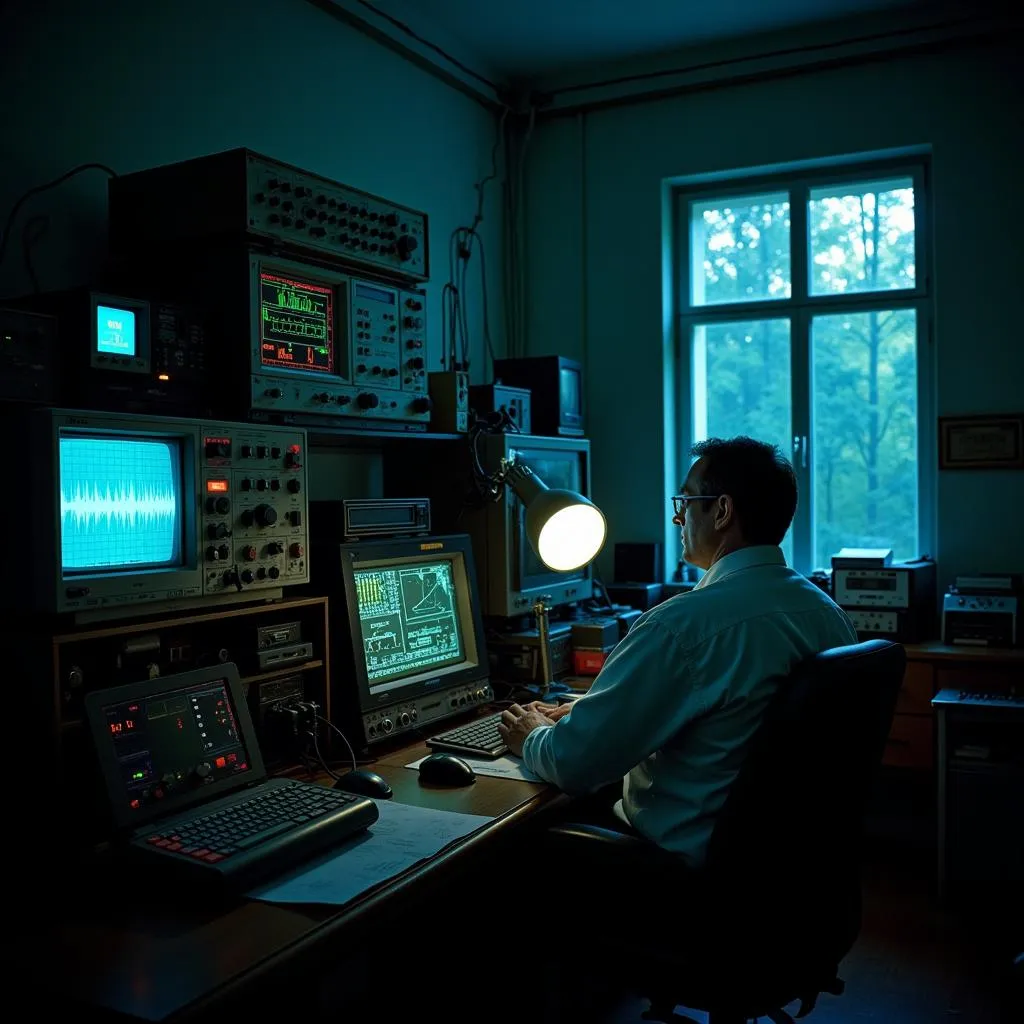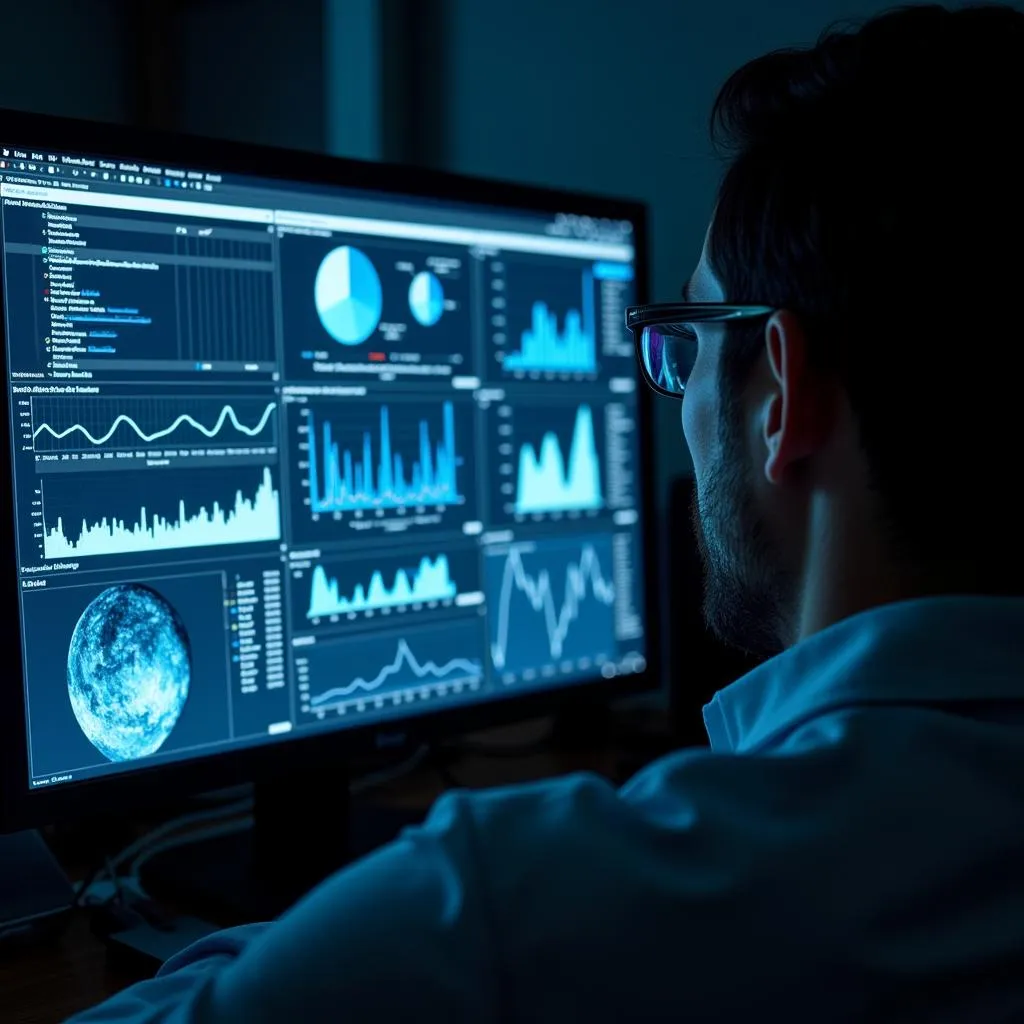The world of paranormal research is often shrouded in mystery, conjuring images of flickering candles, haunted houses, and whispered incantations. But behind the veil of the unexplained, there’s a different breed of investigator: the Lab Researcher. These individuals bring the scientific method to bear on the supernatural, seeking to understand the unexplainable through rigorous testing and analysis.
Bridging the Gap: Science Meets the Supernatural
 Lab Equipment for Paranormal Research
Lab Equipment for Paranormal Research
Lab researchers in the paranormal field occupy a unique niche. They are tasked with applying the principles of physics, biology, psychology, and other scientific disciplines to phenomena that often seem to defy conventional explanation. This involves designing experiments, collecting data, and analyzing results with the same rigor and skepticism as any other scientific endeavor.
The Tools of the Trade: Investigating the Unknown
While the specific tools and techniques employed by lab researchers vary depending on the phenomenon being studied, some common elements include:
- Electromagnetic Field (EMF) Detectors: These devices measure fluctuations in electromagnetic fields, which some believe may be associated with the presence of spirits or other paranormal entities.
- Audio Recorders: From high-fidelity microphones to specialized EVP (Electronic Voice Phenomena) recorders, these tools capture sounds beyond the range of human hearing, potentially revealing messages from the other side.
- Infrared and Thermal Cameras: These cameras detect variations in heat and light invisible to the naked eye, often used to identify cold spots or other thermal anomalies associated with paranormal activity.
Analyzing the Evidence: Separating Fact from Fiction
 Analyzing Paranormal Data
Analyzing Paranormal Data
Collecting data is only the first step for a lab researcher. The real challenge lies in analyzing the findings objectively, filtering out potential biases or external influences. This often involves:
- Statistical Analysis: Applying statistical methods to determine the significance of any observed patterns or deviations from expected results.
- Control Groups: Comparing data collected during paranormal investigations to data collected under controlled conditions to rule out environmental factors or equipment malfunctions.
- Peer Review: Sharing findings with other researchers for independent scrutiny and validation, ensuring the integrity and reliability of the research.
The Importance of Lab Research Skills
If you’re interested in pursuing a career in paranormal research, honing your lab research skills is crucial. For more information on developing the necessary expertise, you can explore our dedicated page on lab research skills.
The Future of Paranormal Research: A Blend of Tradition and Technology
The field of paranormal research is constantly evolving, with new technologies and methodologies emerging all the time. As our understanding of the brain, consciousness, and the universe expands, so too will our ability to investigate the paranormal with greater precision and insight.
Conclusion: Shedding Light on the Unexplained
Lab researchers play a vital role in the ongoing quest to understand the paranormal. By applying the rigor of the scientific method, they bring a much-needed dose of objectivity to a field often dominated by subjective experiences and anecdotal evidence. While the mysteries of the paranormal are far from solved, the dedication and ingenuity of lab researchers offer a beacon of hope for those seeking answers in the darkness.
FAQs about Lab Researchers in Paranormal Investigations
1. What qualifications do lab researchers in paranormal research need?
While there’s no formal degree in “paranormal investigation,” many researchers come from backgrounds in science, engineering, psychology, or related fields.
2. Is paranormal research considered a legitimate scientific discipline?
Paranormal research is often met with skepticism from the mainstream scientific community due to the difficulty in replicating results and the lack of a unified theoretical framework.
3. What are some of the challenges faced by lab researchers in this field?
Funding, ethical considerations, and the subjective nature of paranormal phenomena are some of the key challenges encountered by researchers.
4. Can I become a lab researcher in paranormal investigation without a scientific background?
While a strong foundation in science is beneficial, individuals with a passion for the paranormal can contribute through volunteer work, citizen science projects, or by developing skills in data analysis or technical writing.
5. What are some resources for learning more about Paranormal Research?
Universities with parapsychology programs, online forums, and organizations like the Society for Psychical Research offer valuable resources for those interested in learning more.
Delve Deeper into the World of Paranormal Research
If you’re intrigued by the role of lab researchers in uncovering the secrets of the unknown, you might find our article on army research lab jobs insightful.